
APERTURE
Scope & Guideline
Illuminating Contemporary and Historical Art Practices
Introduction
Aims and Scopes
- Contemporary Visual Culture:
The journal explores the role of photography in contemporary society, examining how images shape public perception, cultural identity, and historical memory. - Artistic Practices and Innovations:
APERTURE highlights innovative practices in photography, showcasing artists who push the boundaries of the medium through experimental techniques and conceptual frameworks. - Social and Political Commentary:
The journal often addresses social and political issues through photographic narratives, reflecting on themes such as identity, race, and activism. - Diverse Perspectives:
APERTURE is committed to featuring a wide range of voices in photography, including underrepresented artists and marginalized communities, fostering a more inclusive discourse. - Historical Contextualization:
The journal provides historical context to contemporary photography, exploring the evolution of the medium and its impact on art and society.
Trending and Emerging
- Intersectionality in Photography:
Recent publications increasingly explore intersectional themes, combining perspectives on race, gender, and cultural identity to reveal complex narratives within the photographic medium. - Community and Collaborative Practices:
There is a growing emphasis on community-driven projects and collaborations among artists, which highlight collective experiences and shared histories, often in response to social movements. - Archival and Historical Reimaginings:
The journal is trending towards works that engage with archival materials and historical photography, reinterpreting past narratives to address contemporary issues and identities. - Digital and New Media Integration:
The integration of digital technologies and new media in photographic practices is a rising theme, reflecting how artists adapt to and critique the digital age's influence on visual culture. - Environmental and Ecological Themes:
APERTURE is increasingly publishing works that address environmental issues and ecological concerns, underscoring the role of photography in advocating for sustainability and awareness of climate change.
Declining or Waning
- Traditional Photojournalism:
There appears to be a waning interest in conventional photojournalism, as the journal increasingly emphasizes artistic interpretations of visual culture rather than straightforward documentary approaches. - Purely Aesthetic Photography:
The focus on photography that prioritizes aesthetics without deeper conceptual or social engagement is declining, as readers and contributors favor works that provoke thought and dialogue. - Commercial Photography:
Themes surrounding commercial or advertising photography are becoming less prominent, with a shift towards more personal, narrative-driven projects that question the role of commercialism in art.
Similar Journals

ART IN AMERICA
Exploring the Pulse of Contemporary ArtART IN AMERICA is a prominent journal dedicated to the exploration and critique of contemporary visual arts and practices within the United States and beyond. Published by BRANT PUBL, INC, the journal serves as an authoritative platform for scholars, artists, and enthusiasts alike, fostering vibrant dialogue and insightful analysis in the field of art. With an ISSN of 0004-3214 and a legacy dating back to 1979, ART IN AMERICA has established itself within the Q4 category of Visual Arts and Performing Arts according to the 2023 category quartiles. Although the journal currently does not offer Open Access options, it remains accessible to a diverse readership through its distribution across libraries and institutions. The journal's significance is underscored by its ability to spotlight emerging trends, critique canonical works, and promote diverse artistic voices amidst a constantly evolving cultural landscape. Researchers, professionals, and students will find ART IN AMERICA not only a valuable resource for scholarly discourse but also an essential guide to understanding the complexities and intricacies of the American art scene.
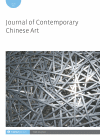
Journal of Contemporary Chinese Art
Navigating the Intersection of Art and Society in ChinaThe Journal of Contemporary Chinese Art is a prestigious academic publication dedicated to advancing the discourse surrounding contemporary artworks and artistic practices in China. Published by INTELLECT LTD, this journal features insightful articles and research that catalyze discussions among scholars, practitioners, and students within the Visual Arts and Performing Arts fields. With an ISSN of 2051-7041 and an E-ISSN of 2051-705X, the journal operates without open access, yet remains a pivotal resource as reflected in its Q2 ranking in the 2023 category of Visual Arts and Performing Arts, positioning it within the 70th percentile on the Scopus Ranks. Covering a diverse range of topics from global influences on Chinese art to the socio-political dimensions of artistic expressions, the journal aims to foster a deeper understanding of contemporary cultural dynamics. Since its inception in 2019 and continuing through 2024, it has established itself as a critical platform for emerging voices and established experts alike, making it an essential read for anyone engaged in the study and appreciation of modern Chinese art.

Religion and the Arts
Celebrating the Dynamic Relationship Between Belief and ArtistryReligion and the Arts is a distinguished scholarly journal published by BRILL, based in the Netherlands, with a dedicated focus on the interdisciplinary exploration of religion and its interplay with various artistic expressions from historical and contemporary perspectives. Established in 1996, this journal serves as a vital platform for researchers, professionals, and students interested in Cultural Studies, History, Religious Studies, and the Visual and Performing Arts. Despite its current classification in the Q4 category across multiple fields, it remains committed to advancing academic discourse and fostering innovative approaches to understanding the complex relationships between spirituality and artistic creation. With its ISSN 1079-9265 and E-ISSN 1568-5292, the journal invites submissions that contribute to enriching this dynamic field, ensuring that a diverse range of voices and perspectives are represented. Although not an Open Access publication, the journal’s content continues to be pivotal for scholarly engagement and is essential reading for those dedicated to the study of art's profound connections with religious traditions.
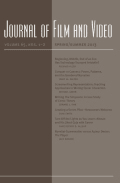
JOURNAL OF FILM AND VIDEO
Fostering Scholarly Excellence in Media StudiesThe JOURNAL OF FILM AND VIDEO, published by University of Illinois Press, is a pivotal academic platform that delves into the intricate intersections of film, video, and media studies. With a notable ISSN of 0742-4671 and E-ISSN 1934-6018, this journal has established itself as a significant contributor to the visual arts and performing arts field, currently positioned in Q3 of its category as per the 2023 quartiles. Spanning from 2002 to 2024, it presents a comprehensive array of research, critiques, and theoretical discussions that advance scholarly discourse in film and video. The journal encourages contributions that explore innovative narratives and methodologies, catering to a diverse readership of researchers, professionals, and students alike. While it maintains a traditional subscription model and is not open access, its impact is amplified through its Scopus ranking, holding the 323rd position out of 667 in the visual arts and performing arts category. With its commitment to fostering critical conversations and promoting scholarly excellence, the JOURNAL OF FILM AND VIDEO remains an essential resource for those invested in the study and understanding of film and media.
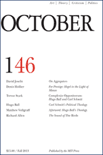
OCTOBER
Challenging Boundaries, Inspiring DialogueOCTOBER is a seminal journal published by MIT PRESS that spans a diverse array of interdisciplinary themes within the humanities, specifically focusing on literature and literary theory, music, and the visual arts and performing arts. Established in 2002, this journal has become a cornerstone for scholars and practitioners seeking critical discourse and innovative research across its converged fields, maintaining a respectable impact factor that attests to its influence in academic circles. While OCTOBER currently does not offer open access, it provides valuable insights and analysis that drive contemporary thought and discussion, positioned in the Q2 and Q3 quartiles of Scopus rankings. The journal’s commitment to high-quality scholarship makes it an essential resource for those looking to deepen their understanding of cultural and artistic practices, reflecting the evolving landscape of the arts and humanities from a rigorously theoretical perspective.

GOYA
Bridging Artistic Practices and Societal ImpactGOYA, published by the esteemed FUNDACION LAZARO GALDIANO, is a pivotal journal in the field of Visual Arts and Performing Arts. With an ISSN of 0017-2715, this Spanish journal serves as a critical platform for scholars, artists, and practitioners to engage with contemporary issues, trends, and methodologies in the arts. Since its inception, GOYA has strived to illuminate the intersection of artistic expression and cultural discourse, with coverage spanning from 2002 to 2024. The journal proudly holds a Q3 category ranking in the 2023 Scopus assessments for its field, reflecting its respected position among peers, with a notable rank of #377 out of 667. Though it does not follow an Open Access model, GOYA continues to contribute significantly to the academic landscape, enabling a deeper understanding of artistic practices and their societal implications. Researchers and students alike will find the journal an invaluable resource for insights and inspiration within the dynamic realm of the arts.
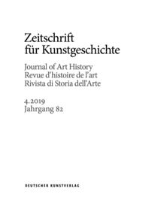
ZEITSCHRIFT FUR KUNSTGESCHICHTE
Illuminating Visual Narratives and Performative ExpressionsZEITSCHRIFT FUR KUNSTGESCHICHTE is a prestigious journal dedicated to the study of art history, offering insightful analyses and discussions that enrich the understanding of visual arts and performing arts. Published by DEUTSCHER KUNSTVERLAG GMBH in Germany, this journal has established itself as a significant platform for researchers and professionals alike since its inception. With a print ISSN of 0044-2992 and an e-ISSN of 2569-1619, it spans a comprehensive range of topics in art history, reflecting both traditional and contemporary perspectives. Although categorized in the Q4 quartile for Visual Arts and Performing Arts, the journal contributes to a rich dialogue within its field, aiming to foster academic discourse and promote scholarly research. Its scope has evolved notably from converged years starting in 1975 and gathering strength from 2001 to 2024, and it is committed to serving as an essential resource for students, academics, and practitioners in the arts. While not offering open access, the journal maintains a rigorous peer-review process to ensure high-quality submissions that advance knowledge and stimulate critical thought.

Anales de Historia del Arte
Fostering Global Dialogue in Art and HumanitiesAnales de Historia del Arte is a distinguished open-access journal published by Univ Complutense De Madrid, focusing on the diverse fields of art history, visual arts, and performing arts. Since its inception in 2005, this journal has provided a platform for scholars and researchers to disseminate original research, critical reviews, and theoretical discussions that enhance the understanding of artistic developments throughout history. Located in Madrid, Spain, and embracing a global perspective, it plays a crucial role in fostering dialogue within the arts and humanities sectors. The journal is currently categorized in the Q4 quartiles of its respective fields according to Scopus metrics, ranking among approximately 15-25% of publications within the arts and humanities domains as of 2023. Researchers and academics can take advantage of the open-access model, allowing for wider dissemination of knowledge and enhancing the accessibility of critical discourse in art history. Explore Anales de Historia del Arte for its significant contributions to emerging trends and established research in the arts.
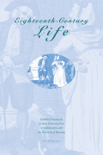
EIGHTEENTH-CENTURY LIFE
Revealing the Art and Ideas of the 18th CenturyEIGHTEENTH-CENTURY LIFE is a prominent academic journal published by DUKE UNIVERSITY PRESS, focusing on the interdisciplinary study of the 18th century through the lenses of Cultural Studies, History, Literature, and the Visual Arts and Performing Arts. With an established history since 1977, this journal serves as a vital platform for scholars and students to publish innovative research and critical discourse, shedding light on the complex social, political, and artistic currents of the 18th century. Despite its current ranking in the lower quartiles according to Scopus, the journal continues to foster scholarly dialogue and contribute to the understanding of this pivotal era in Western history. Its accessible yet scholarly articles make it a valuable resource for researchers, educators, and students alike, facilitating engagement with 18th-century studies from various disciplinary perspectives.

ARTIBUS ASIAE
Fostering Insight into Cultural Heritage and CreativityARTIBUS ASIAE, published by ARTIBUS ASIAE, is a distinguished journal focused on the fields of Archeology and Visual Arts and Performing Arts. Based in Switzerland and with a history of converged years from 2002 to 2024, this journal serves as a vital platform for scholarly discourse and research dissemination within the arts and humanities. Although it currently does not offer open access, ARTIBUS ASIAE maintains a commitment to academic integrity and quality, as evidenced by its presence in Scopus rankings, which places it in the Q4 tier for both Archeology and its niche in the arts and humanities, while achieving a Q3 ranking in Visual Arts and Performing Arts. With an emphasis on advancing knowledge and understanding across various disciplines, ARTIBUS ASIAE is an essential resource for researchers, professionals, and students seeking to enrich their understanding and contribute to the ongoing dialogue in these significant areas of study.